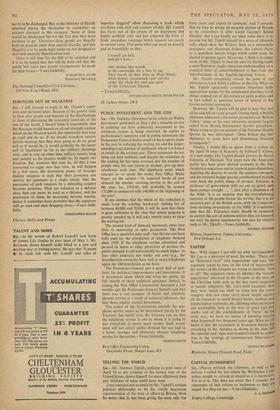PUBLIC INVESTMENT AND THE GPO Sus.,—Mr. Nicholas Davenport in his
article on 'Public Investment' published on May 1 did a valuable service in pointing out how arbitrarily investment in the telephone system is being restricted. In replies to parliamentary questions and in public statements the Postmaster-General makes much of the progress made in the past in reducing the waiting list and the larger- sounding total number of applicants whom it is hoped to satisfy in the coming year. These statements do not bring out how suddenly and sharply the reduction in the waiting list has been arrested, nor the number of people who, for one reason or another, give up their telephones each year. The significant point which emerges is—to quote the recent Post Office White Paper on the subject—'At expected levels of new demand the number awaiting service at the end of the year, i.e., 1959-60, will probably be around 137,000 as compared with 140,000 at the beginning of the year.'
If one assumes that the whole of this reduction is made from the existing 'hard-core' waiting list of between 60,000 and 70,000, it will be seen that there is great substance in the view that unless progress is greatly speeded up it will take twenty years to clear the waiting list.
The present level of demand, moreover, owes very little to canvassing or sales promotion. The Post Office has a specialist sales staff—but this has not been fully used for the stimulation of telephone demand since 1939. If the telephone service advertised and pressed its wares as other purveyors of services do, public demand would undoubtedly be much higher. In fact other countries not unlike our own (e.g., the Scandinavian countries) have half as many telephones again per 100 population as we have, The Postmaster-General gets a good deal of pub- licity for technical improvements and innovations. It is investment alone which will bring the public the full benefit of these technical advances. Indeed, in issuing the Post Office Commercial Accounts a few months ago the Postmaster-General himself said that there was a real prospect of-better and relatively cheaper service as a result of technical advances; but that these require capital investment.
The policy of the Government towards the tele- phone service seems to be determined purely by the Treasury; but surely even the Treasury can see that the telephone service is one in which it is going to pay everybody to invest more money. Such invest- ment will not satisfy public demand but can lead to a better, stronger and ultimately cheaper telephone service for the nation.—Yours faithfully, CHARLES SMITH Post Office Engineering Union, Greystoke House, Hanger Lane, WS


































 Previous page
Previous page